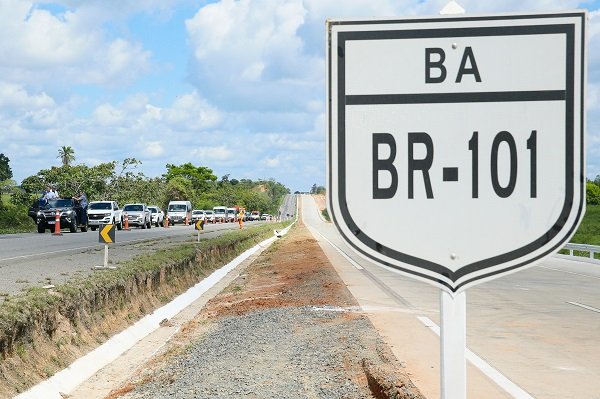Research by the National Transport Confederation (CNT) indicates that 67.5% of Brazilian highways are evaluated as regular, bad, or very poor. This means that for every ten kilometers of Brazilian roads, almost seven are considered problematic, while 32.5% were classified as excellent or good. The condition of roads directly affects costs of transport and the roads’ security conditions, in terms of intentional violence.
The Research
The numbers are part of the 26th edition of the CNT Highway Survey, released this Wednesday (29/11), in partnership with the Social Transport Service and the National Transport Learning Service. This year’s survey evaluated 111,502 kilometers of paved highways, which corresponds to 67,659 kilometers of the federal network and 43,843 kilometers of the main state stretches.
Stability
The results showed relative stability in the general condition of the Brazilian road network, compared to last year’s results, which were, respectively, 66% and 34%.
Assessment
Three points of the road network are evaluated: pavement, signage, and road geometry. In 2023, 56.8% of the pavement, 63.4% of the signage, and 66% of the geometry of these roads were evaluated as fair, poor, and very poor. These results were close to those recorded last year: 55.5%, 60.7%, and 63.9%, respectively.
Best and Worst Highways
The worst highways are:
- 520º AM-010 (Torquato Tapajós) AM Manaus to Itacoatiara
- 519th PB-400 PB Cajazeiras to Conceição
- 518º BR-364 (Marechal Rondon) AC Cruzeiro do Sul to Acrelândia
- 517th PE-096 (Dom Henrique Soares da Costa) PE Palmares to Barreiros
- 516th MA-106 MA Governor Nunes Freire to Alcântara
- 515º PE-126 PE Palmares to Quipapá
- 514º AC-010 (Porto Acre Road) AC Porto Acre to Rio Branco
- 513º AP-010 (JK highway) AP Macapá to Mazagão
- 512º PA-263 PA Goianésia do Pará to Tucuruí
- 511º BR-174 (Manaus-Boa Vista) AM Presidente Figueiredo a Borba
The best highways are:
- 1st RJ-124 (Via Lagos) RJ Rio Bonito to São Pedro da Aldeia
- 2nd SP-270 (Raposo Tavares) SP Presidente Epitácio a Ourinhos
- 3rd SP-225 (Paulo Nilo Romano/Commander João Ribeiro de Barros) SP Itirapina to Santa Cruz do Rio Pardo
- 4th BR-153 (Transbrasiliana) TO Aliança do Tocantins a Talismã
- 5th SP-463 (Jorge Maluly Netto/Elyeser Montenegro Magalhães) SP Ouroeste to Clementina
- 6th SP-320 (Euclides da Cunha) SP Rubinéia to Mirassol
- 7º BR-080 GO Vila Propício a Padre Bernardo
- 8th SP-191 (Wilson Finardi/Irineu Penteado/Carlos Mauro) SP Mogi Mirim to São Pedro
- 9th BR-364 (Marechal Rondon GO Jataí to São Simão
- 10th BR-493 (Metropolitan Arch) RJ Itaboraí to Itaguaí
Regions
The North region had the worst rates in the survey:
- almost 16% in poor condition
- 25%, bad
- Acre is the worst state, 48% of the roads are in terrible condition and less than 1% are in good condition
The Southeast, which has the largest road network in the country, had:
- 43% of highways rated as good or excellent
- 26% are bad or very bad
- São Paulo stands out with 74% of roads well evaluated
The Midwest region:
- 16% of bad or terrible roads, the lowest percentage among all
- 48% were regular
- 36% in good or excellent condition
In the South region:
- around 32% of highways are in excellent or good condition
- 24% are bad or very bad
Recovery
The confederation’s study estimates that the investments needed to recover Brazilian highways, with emergency reconstruction, restoration, and maintenance actions, total more than R$94 billion. This year, the government authorized the investment of R$15.01 billion in road infrastructure, R$9.05 billion of which was used until September.
Consequences
The lack of quality in road paving impacts the price of freight and, consequently, the price of products for the end consumer. Transport companies spend more on fuel and maintenance of their vehicles. CNT research estimates that this year there will be an unnecessary consumption of R$1.1 billion liters of diesel due to the poor quality of the road network, which will cost transport companies R$7.49 billion. There is also an environmental aspect to this, as fossil fuel consumption and gas emissions grow in proportion.
There is also an impact on safety in terms of accidents and intentional crimes. The loss generated by accidents was R$13.4 billion in 2022. In addition, criminals use poor lighting conditions, potholes, and other factors that can force drivers to reduce their speed to take action. Often, attacks occur even after an accident. This is very common in the overturning and breakdown of cargo trucks, which are stolen or stolen.




